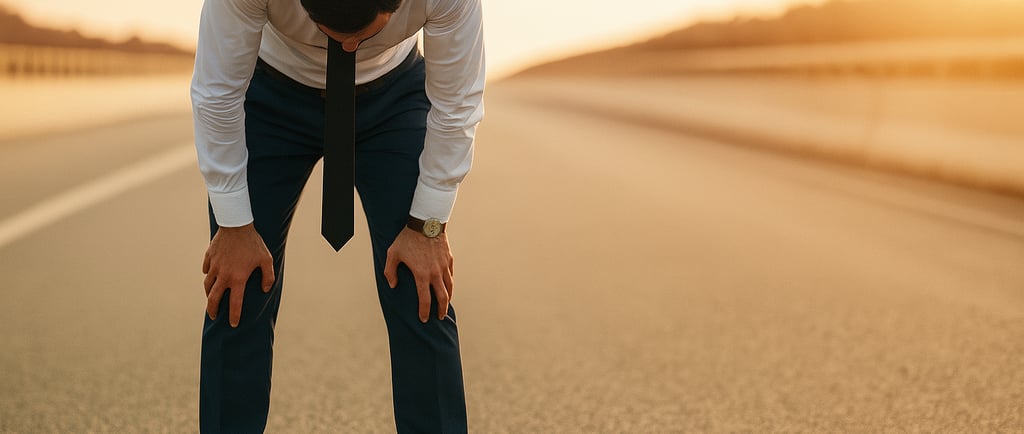Erik Caseres - Coldwell Banker Commercial CBS
Rest Is Not a Reward—It's a Requirement: What Business Leaders Can Learn from Elite Athletes
This article explores how true peak performance in business—just like in elite sports—requires intentional rest and recovery, challenging the toxic hustle culture that glorifies exhaustion.
BIG SKY BIZ JOURNAL
Erik Caseres
7/28/20254 min read


Right now, I’m on vacation. For once, my phone isn’t buzzing every five minutes, and my day doesn’t revolve around back-to-back meetings or negotiating the next deal. Instead, I’ve had time to think—and what keeps coming to mind is how long it took me to really understand the value of rest.
In the world of elite sports, recovery isn’t optional. It’s strategy. Top athletes sleep more than average (often 9–10 hours per night), schedule downtime with as much rigor as they do workouts, and treat their mental well-being with the same seriousness as physical conditioning. Why? Because they know one simple truth: performance suffers without recovery.
Oddly, this logic seems to vanish when we talk about business. In fact, we often celebrate the opposite. Hustle culture tells us that rest is for the weak. We glorify late nights and early mornings. We compare calendars like battle scars. I know this firsthand—I wore my 4–5 hours of sleep per night like a badge of honor during my W2 years. I wasn’t just grinding; I was proving something.
Or so I thought.
But now, after years of working for myself and learning to build something sustainable (not just successful), I’ve begun to feel the difference. I can tell when I’m sharp and when I’m dull. I notice how quickly fatigue creeps in when I’ve let rest slide. And the biggest difference? I can admit it now. That wasn’t weakness. That was growth.
The Science of Rest and Performance
The research backs this up. In a study published in Occupational & Environmental Medicine, researchers found that chronic sleep deprivation led to performance declines equivalent to being legally drunk. After just 17–19 hours without sleep, subjects performed at the same level as those with a blood alcohol content of 0.05% to 0.1%.
Other studies have shown that sleep-deprived individuals experience reduced decision-making abilities, slower reaction times, and impaired memory. In short: if you're running a business—or a team—while running on empty, you're not at your best.
Athletes have long known this. LeBron James reportedly sleeps 12 hours a night during the season. Usain Bolt famously said that sleep was his “most important part of training.” Tom Brady has built an entire brand around rest and recovery protocols. Why? Because pushing without recovery doesn’t just stall progress—it causes breakdown.
And yet, in business, we behave like the rules don’t apply to us. We act as if mental fatigue is something we can power through with another cup of coffee. But burnout isn’t fixed by caffeine—it’s fixed by rest.
The Law of Diminishing Returns
There’s a point in every endeavor—athletics, business, even parenting—where more effort doesn’t equal better results. Economists call it the law of diminishing returns. And while it’s often used to describe productivity, it applies just as much to energy.
The truth is: there comes a point where pushing harder leads to less impact. When you’re tired, your creativity dips. Your decision-making falters. You miss cues. You become reactive instead of strategic.
This isn’t about being lazy. It’s about recognizing that, like athletes, business leaders, entrepreneurs, and professionals need structured recovery. Not just the occasional vacation—but daily, weekly, and monthly rhythms of renewal.
Building Recovery Into the Routine
What does that look like in real life?
Sleep like it matters. Because it does. Aim for 7–9 hours—every night.
Create hard stops. You don’t have to answer emails at 11 p.m. You really don’t.
Build in white space. Not every moment of your calendar needs to be filled. Some of your best ideas will come when you’re not trying so hard to have them.
Protect your mornings. How you start your day matters more than how many hours you cram into it.
Take real vacations. The kind where you leave the laptop closed and remember what your kids look like in daylight.
Rest Is a Discipline, Not an Indulgence
If you’re like me, the hardest part about rest isn’t logistics—it’s guilt. We’ve been taught to equate busyness with value. But busyness isn’t the same as impact. And exhaustion isn’t a virtue.
So here’s my reminder to myself—and maybe to you too: rest isn’t what you do after the work is done. It’s what allows the work to be great in the first place.
Elite athletes don’t apologize for sleep. They prioritize it. Because they know what’s at stake. So should we.








Expertise
Specializing in business brokerage services & commercial real estate transactions.
Contact
Inquire
erik@cbcmontana.com
© 2024. All rights reserved.
